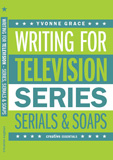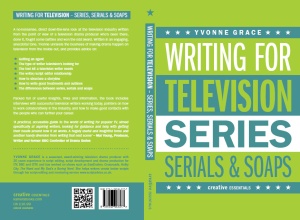I am fresh back from an amazing time at The London Screenwriter’s Festival, where I did four things of note:
1/ Run my session ‘Sizzle and Substance’with Bafta winning writer and show-runner Barbara Machin and Series Producer of Holby City Simon Harper, about how to navigate the hinter lands between commercialism and creativity in writing and creating series television drama.
2/ Contribute to the session run by the life force that is Pilar Alessandra about how to manage the work/family/life balance.
3/ Flash my cleavage to about 200 people as I clumsily navigated my bra; clipping on my mic before my first session.
4/ Wish Hollywood Legend Joel Schumacher luck, until I realised who he was and attempted to remedy this by adding, rather breathlessly, ‘but you; of course, don’t need it’.
So it was, all round, a rather lovely time.
But what I discussed, with the Prince of Holby City and the Queen Bee of Waking the Dead; the knotty issue in popular television long-form drama, of how to strike a balance between the art form of story telling and the need to keep feeding the ratings machine, still remains fresh in my mind.
For those of you that weren’t there, I wish to share with you some thoughts.
At the Sizzle v Substance Session, we discussed, amongst many other questions:
* What makes a successful drama series/serial?
The answer in a nutshell is the show that has at the point of its creation, the right balance between fresh, creativity and hard-nosed commercialism.
Scott and Bailey.
Shameless.
Broadchurch.
* What works best – pure art or artifice?
Plunging into the nut bowl again; the answer is a combination of both. All successful long form dramas, (essentially those that are episodic and repeating) need a big fat dollop of juicy story at their centre and living in this world, there must be credible, developed, three dimensional characters. They also need a structure, a framework, the scaffolding in place to hold up the creative components of the drama.
Long-form television drama is that illusive hybrid of hard-nosed commercialism and genuine artifice.
With the need to combine the artist and the artisan in mind, when writing successful television drama, here is a story for you:
Back in 1999 I was asked to Produce Holby City series 2. It was expected of me to turn this show around. Holby was then (and still is) a great show, but it was not getting the projected ratings expected of a prime time drama scheduled in the family slot. So I did what any sane producer would do in the circumstances. I appealed to the writers to give me great story.
Within the medical remit of the show (then solely Cardio Thorasic so any condition pertaining to the upper body and heart) writers had to come up with story lines that made a wide demographic sit up and take notice. Cynically, I said we would ‘wrap the medical around’ the essential drive of the stories I was looking for. That is, those that had an emotional heart (forgive the pun) and truth about them. This, in the most part, worked.
But the best episodes of my series, those that gained a 9 million rating and peaked at 10 million at Christmas, where the ones where I had managed to engineer stories that were essentially medical in nature, but those that resonated wider; caused emotional ripples through a variety of characters’ lives.
The example I can give here is the story about a young girl who, suffering from Cystic Fibrosis, had to have both her parents donate a portion of their lung to save their daughter’s life. The father, it turned out, could not contribute. He was not a blood match. And so this story ballooned from a standard ‘I will save you in this medical emergency because I love you’ to a story about long kept family secrets, betrayal and ultimately a fragile re-union between the girl and her real father.
This is an example of a story that has a commercial appeal, and also an emotional root. The Sizzle is there, (the dynamics between a family at war whilst a daughter is dying) but also the Substance (the story ticks all the boxes of a long running drama with a medical precinct).
It’s a knotty problem this. The dual-need to create something fresh, new, different, creative, from a genuinely artistic, credible foundation and that need to also to make this new thing, this new dramatic idea, into a saleable, water-tight, competitive format.
Writers of television drama, have to be multi-facetted by nature.
They are both the creator, or artist, and then the draftsman; they must draw up a blue print for this drama series; make sense of the original artistic splurgings. Then they don the Plumber’s hat. Because they also need to be a hands on practical sort. The sort who can work out all the interconnections between story lines and know how best to maximise the junctions of all those story pipes laid down.
If need be, a television writer needs to know how to make their drama series – flush – or actually work.
You are Jackson Pollock – you splash paint around – but you are also required to bring a bit of Escher to the table; clear thinking, good with line, expert at someone who knows how the bigger picture fits together and to know how to disguise; like all the best craftspeople do, the joints, the joins, the ugly interiors of the drawers and secret compartments of the piece you are crafting out of thin air.
So we need structure as well as innovation in our work as writers and producers of television drama.
Those of you that have bought/shared/looked over someone else’s shoulder whilst they read my book on writing for television; not surprisingly called Writing for Television – Series, Serials and Soaps http://www.amazon.co.uk/Writing-Television-Yvonne-Grace/dp/1843443376/ref=sr_1_7?s=books&ie=UTF8&qid=1400840643&sr=1-7&keywords=writing+for+television – will know that in those pages I go into detail about treatments, story line documents and story lines. I go on a lot about using documents and how to do so to make your stories sing as you write your television scripts – I mention the Series Outline, but I do not go much further than that.
I am remedying this here.
How you write a good SERIES OUTLINE for television:
This document is not a dry thing. It is an exciting, vibrant, layered piece of writing that shows, without the use of mirrors or smoke, what your series drama is all about.
It is a microcosm of all your musings; a distillation of the series as a whole. Like the treatment that goes before this, (in terms of your long running story’s development) it condenses the themes, messages, tone, characters, world, main narrative arcs and episode content down to a manageable number of pages.
It is an extension of your idea, but it is not a sentence by sentence, beat by beat description of your series drama.
Do not confuse your SERIES OUTLINE with an EPISODE OUTLINE or, what is called A BEAT SHEET in feature film circles. We use Beat Sheet too now, more often, in television, (trying to keep it real you know) and I like the term because it does what it says on the tin. A Beat Sheet is just that. Story; laid out, beat by beat.
Producers don’t need to see this in your Series Outline.
They want to see and understand and know the following things from your document:
1/ What is the world in which the story is set? Is it an engaging world and how is it so?
2/ Who lives in this world and what are the characters about? What makes them tick? Are these people identifiable? Who will we love? Who will we hate? Who will we hate loving?
3/ What is the content in broad strokes of the first (pilot) episode? What is the content (again, excitingly, enticing told, not beat by beat) of the middle episode and what again, is the end episode’s content? How does this start? How does this series end?
4/ SET PIECES. Producers of tv drama LOVE a set piece. What is the image, the exchange, the moment, the climax of a story line in each of the episodes you are outlining here?
In every episode, in every long form drama format worth its salt, there will be one moment, one image, one sequence that sticks in your mind, while the credits roll and beyond.
Similarly, having read your Series Outline, there will be (if you get it right) at least one singular, memorable moment, or series of moments that stay with the Producer/Commissioner. You need to make sure you have these in your Series Outline.
We are dealing with images, albeit ones told in words; black and white on the page.
Visualise your stories and your Series Outline will come alive and sell your series for you.
There are practical elements to get across in this document too:
1/ Setting 2/ Number of characters 3/ Period or no? 4/ Genre 5/ Episode numbers/format length
Tone. Use the hybrid terminology here. It always works. Sci Fi / Peaky Blinders (that would be an awful show but you get the idea) Downton Abbey/Rom Com (similarly; bound to be terrible, but we know what it is about in two five syllables.)
If, in the development process, you have got to the Series Outline stage, chances are, someone with potential money to make it and a potential route to transmit it, is interested in your idea.
Don’t give them a reason to say no.
Make them fall in love with the sheer story content, the characters, the set pieces, the tone and the overall message of your drama series/serial.
They will, from this moment on, try to make their budget fit your ideas.
Get busy.
Get writing.
My group Script Advice Writer’s Room is great resource for writers of the big and small screen. Writers all actually; there are poets and novelists amongst us – writers who write or radio, theatre as well as television and pen screenplays. Join me and them, here https://www.facebook.com/groups/237330119115/
Twitter: YVONNEGRACE1
Script Advice is here to help.











